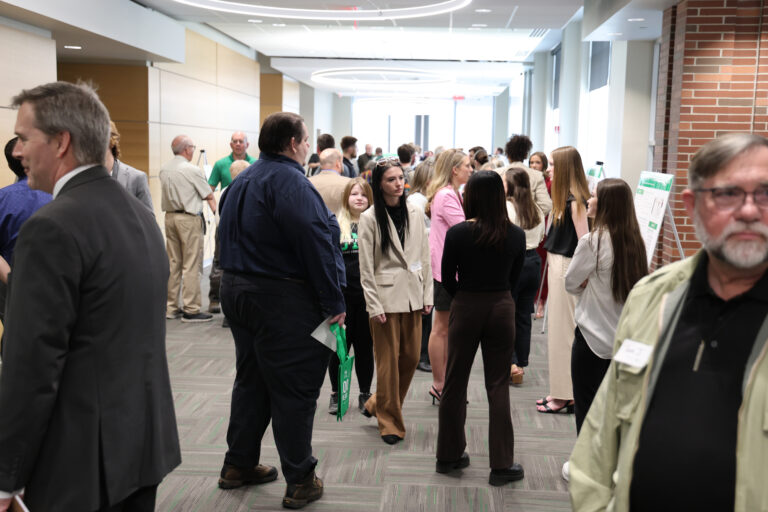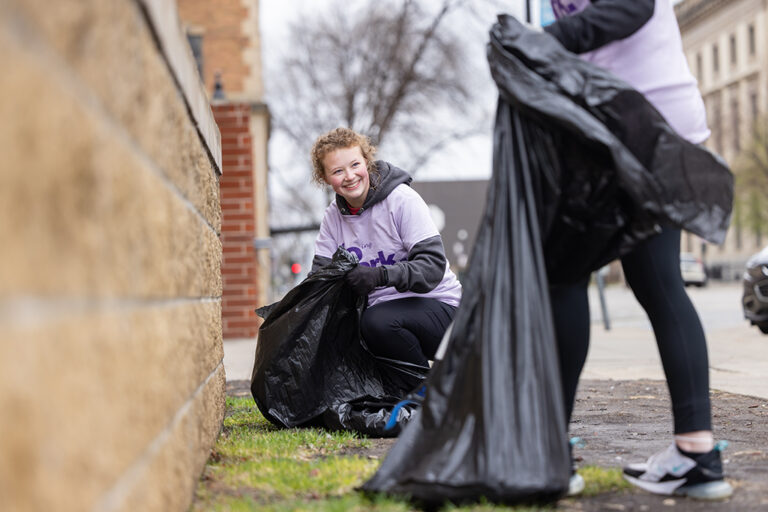The process of progress
For Pride Month, departments across campus describe their efforts to promote LGBTQ+ inclusion

Since its reopening in 2019, UND’s Pride Center has actively engaged with departments across campus to promote inclusion and foster a welcoming environment for LGBTQ+ students at the University.
Jeff Maliskey, director of the Pride Center, has been instrumental in facilitating discussions and workshops to broaden acceptance and understanding for UND’s LGBTQ+ community, working with diverse groups to help UND grow.
Professional disciplines stand for Pride
In 2019, the Nursing and Social Work departments plus the School of Medicine & Health Sciences collaborated with Maliskey to offer a workshop on ally training. The result was a successful event that led to other opportunities for students and faculty to learn more about best practices when supporting the LGBTQ+ community.
Stephanie Christian, chair of the Department of Nursing, said that the workshop inspired faculty to incorporate education on language and understanding when treating those who identify as part of the LGBTQ+ community. For Christian, this work is an essential piece of the profession.
“Nurses are on the front line, and the first interaction people have when entering the healthcare system is usually with a nurse. That first interaction is so important, and we want to help students create a good, safe environment for everyone they’re caring for.”
She adds that reducing the challenges faced by members of the LGBTQ+ community is a motivator for her department to continue its support of the community.
“It hurts my heart to hear stories of LGBTQ+ people struggling to find healthcare professionals,” she said. “But our students really want to provide good care and a safe environment for everybody.”
Nursing has since incorporated LGBTQ+ ally training into the department’s coursework, helping students with common concerns and promoting knowledge of procedures and care specific to the community.
Like the College of Nursing & Professional Disciplines, the School of Medicine & Health Sciences also is incorporating LGBTQ+ programming into its coursework, said Michelle Montgomery, a wellness advocate at the School.
Montgomery is also the faculty advisor for Allies in Medicine, a student group focused on bringing additional learning opportunities regarding LGBTQ+ healthcare.
Allies in Medicine invited Maliskey to the med school for an LGBTQ+-focused workshop which led to additional ally training. Soon after, the school faculty began incorporating what they’d learned from Maliskey into their launch programming for new students.
“We want to teach them that, as healthcare professionals, we need to treat the entire community,” Montgomery said. “So, we’re introducing them to the correct vocabulary and common healthcare needs of the LGBTQ+ community so that everyone is prepared and comfortable.”
Montgomery said that she’s noticed an increased interest in LGBTQ+ advocacy among the School’s students, strengthening the School’s awareness about the LGBTQ+ community’s specific needs.

The UND School of Law has also been integrating LGBTQ+ education into its curriculum. In 2021, then-dean Michael McGinniss introduced a session as a part of the school’s first-year Professional Foundations course called “Cross Cultural Competency and Eliminating Discrimination.”
The addition was spurred in part by the American Bar Association’s encouragement of law schools to incorporate into their training education on biases and cultural awareness.
Paul Traynor, assistant professor at the School of Law, leads the session, which focuses on addressing the importance of eliminating discrimination surrounding various social issues, including sexual orientation and gender identity.
Professor of law Julia Ernst — whose article from the State Bar Association’s magazine “The Gavel,” titled “Eliminating Bias Against LGBTQ+ Legal Professionals,” was featured in the course — said that the law school has committed to keep raising students’ awareness of the community.
“The law school faculty and administration understand the importance of supporting all of our law students, regardless of their sexual orientation, gender identity, race, ethnicity, or any other characteristic that has traditionally been marginalized and underrepresented in the legal profession,” she said.
“I am grateful to all of my colleagues, especially Paul Traynor and Mike McGinniss, for supporting this class and other initiatives to ensure our LGBTQ+ students feel welcome and a sense of belonging at the UND School of Law. “
Pride Center Director Maliskey reflected on the campus-wide progress facilitated by the Pride Center’s collaborations and the continued success of workshops and curriculum changes related to LGBTQ+ concepts. “It has been great working with so many departments and individuals across campus,” he said.
“The collaborative efforts go beyond just me coming in for a presentation or meeting on a specific LGBTQ+ topic. Instead, people continue to work together to create new learning opportunities like we have seen this past year with the Nursing, Social Work, and School of Medicine & Health Sciences programs.”
Pride at work and play
Student services outside of academic environments have also been making strides in assisting the LGBTQ+ campus community, with help from Maliskey and the Pride Center.
For instance, Mary Feller, career coach and mentor coordinator for Career Services, reached out to Maliskey for guidance after a transgender student who was concerned about disclosing their gender identity to potential employers approached Career Services staff for assistance.
Feller said Maliskey was eager to help. “Jeff provided information to better support all of our students,” she said. “We started to offer a yearly workshop for LGBTQ+ students, answering questions they might have about entering the workforce. Danielle Schindele has also worked closely with students to help them find inclusive workplaces.”
In addition to individualized career counseling, Career Services has broadened its Suit Up events to be more inclusive of LGBTQ+ students.
“Jeff came out with us a few times and really helped promote the event. It did make a difference in helping some of our students learn how to find business professional attire that made them feel more comfortable,” Feller said.
Similarly, Athletics responded when a student group encouraged the department to adopt LGBTQ+ programming. Tyler Burmeister, director of student-athlete development, said that Maliskey and the students played an integral role in shaping the program’s ally training.
“Our Student-Athlete Inclusion and Diversity group is really excited about creating that inclusive culture for our athletes,” Burmeister said. “We’re seeing the strides that our students and department are taking to support and include all of our athletes. When we give them a voice, it makes a huge difference.”
Maliskey helped Athletics incorporate ally training into the orientation for Hawkademy, their student leadership and mentorship program.
“After seeing the success of our first ally training, we decided to make it a fixture of our Hawkademy program,” Burmeister said, “The way that Jeff does the program fits perfectly with what we’re trying to do: create a welcoming, inclusive environment.”
Burmeister said that it’s important to incorporate education related to marginalized groups to bolster a culture of acceptance and encourage students to broaden their perspectives.
“I think promoting empathy is really important,” Burmeister said. “And the ally training gives our student-athletes the chance to learn how they can support teammates who may be in the LGBTQ+ community.”

Inclusive culture makes a difference
Bruce Reeves, assistant professor and director of field education at the Department of Social Work as well as a member of the Pride Center’s OUTlist, said his experience at UND has been one of welcoming and openness.
Reeves said his work as an inclusion ambassador for the Department of Social Work has given him an optimistic view of the issue.
“The fact that we have a group of people all working together to address diversity and inclusion issues at the university, including LGBTQ+ folks, sets a tone,” he said. “Every college has representatives and ambassadors, and I have many colleagues who are excited about providing a welcoming environment for students and faculty. That’s really heartwarming.”
Furthermore, UND President Andy Armacost’s commitment to diversity and inclusion has created “the most welcoming and inclusive environment” that Reeves has seen over the course of his career, he said.
“The president is putting resources into place to make us feel valued. Things like that make a lot of difference in making this a welcoming place for students.”
Maliskey also is also heartened by the progress UND has made in cultivating a safe environment for LGBTQ+ people. He remains hopeful that the University will continue its progress.
“Our campus is invested in the Pride Center’s mission. The University values the work and knows the impact that is has when we all work together,” he said.
“Although we have to have challenging conversations, I have found those with whom I work to be open to learning and to striving for inclusive excellence. It’s exciting to see community come together, to invest to make campus a better place for LGBTQ+ people.”



